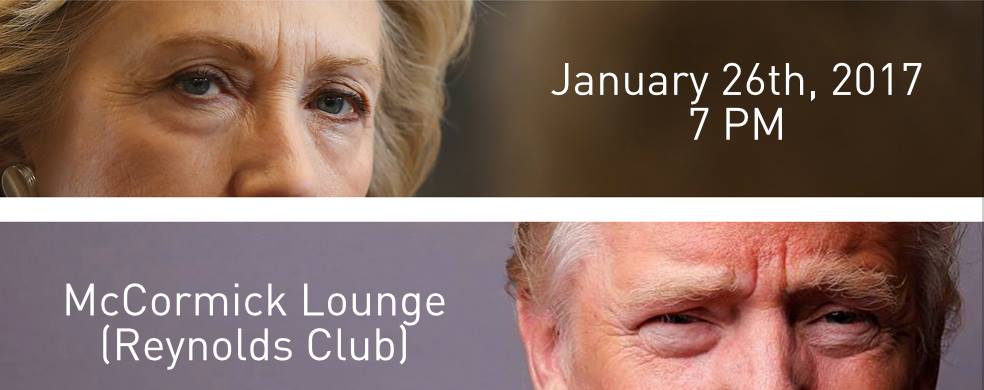A Panel Discussion
26 January 2017 at 7 PM
University of Chicago
Reynolds Club (McCormick Lounge)
5706 S University Ave
Chicago IL 60637
Featuring:
Jerry Harris, socialist & activist
Representative from the Red Party (TBD)
and more!
Leftists today lament the strength of neoliberal hegemony. The use of the word “hegemony” underlines the ideological dimension of the neoliberal order. It suggests that mass ideological legitimacy -- and not the triumph of pure force or of back-door machinations -- have made neoliberalism a political possibility. What were the ideological shifts in political and social consciousness that provided the grounds for this neoliberal hegemony? What role did the Left play in this historical transformation of political consciousness? A consideration of the history of the New Left and its specific demands can help partially illuminate these issues.
The New Left pointed to the difference in standards of living between the ‘first’ and ‘third’ worlds and called for greater global equality; it showed how society’s institutions were dominated and led by straight white men and called for greater diversity; and it expressed widespread disenchantment with the key features of Fordism—a bureaucratic labor movement, conformist universities , alienated “company men” under full employment, etc.—and called for a transition away from this administered society. Neoliberalism has delivered on all three counts: there appears to be greater equality between the first and third worlds, greater diversity within society’s institutions, and seemingly more individuality and unpredictability in social life.
Freedom, once a rallying cry of the Left, is now the stated ideology of the neoliberal program of upward redistribution of wealth. Indeed, the past decades have seen stagnating wages and a widening income disparity, even though women, LGBT people, people of color, and others who once faced legally enforced, identity-based social exclusion now appear to be more “free” than they were during the pre-neoliberal period of high Fordism. These two aspects of neoliberalism—its identitarian inclusiveness and its anti-working class agenda—appear to go hand-in-hand. Today, discontentment with the neoliberal order are expressed in terms of identity-based political constituencies, e.g., “women,” “labor,” “the black community”, integrated “democratically” as objects of the state (in the US, primarily through the Democratic Party). This appeal however, remains no less authoritarian for all of its apparent liberalism.
Although the politics of the New Left has achieved a dubious, partial success in the neoliberal era, today we are perhaps further than ever from the goal of global socialism. In its passing from the 1960s and through the 1980s, the New Left became institutionalized into two semi-autonomous camps, the “academic left” and the “activist left” –– the devolution of the ‘Marxist left’ into activist organizations in the 1980s was part of this transformation. While these camps continue to express a discontent with the status quo, they lack the mass appeal and political opportunity of the 1960s. 2016 has manifested the crisis of Neoliberalism in an acute manner with such phenomena as Brexit and the US Elections. In the 2016 U.S. presidential elections, discontent with neoliberalism expressed itself in the dual form of Donald Trump and Bernie Sanders’ candidacies. Trump ultimately emerged as the more successful of the two, challenging the neoliberal consensus of both parties in a way Sanders did not.
How can we make sense of the Left’s failure in our contemporary moment to lead in the crisis of Neoliberalism? How can we make sense of the success of the Right in its absence? How then, in light of this history, can we imagine a future for the Left? How can the Left rise above the expression of frustrated expectations within neoliberalism to generating the kind of theory and political practice required to challenge capitalism?
The widely publicized killings of black men by police and the resulting movement with its slogan "Black Lives Matter" put back on the agenda of a beleaguered American Left a seemingly perennial question, one that evokes a long history of struggle, longing, and disappointment. With a black president in the White House having survived or co-opted the #Occupy Movement, the Black Question seems to pose a return to the old platitude that America is racist. At the same time, precisely because
Presented by the Platypus Affiliated Society at the University of Chicago, 5 February 2015
Whether it is the gruesome murder of school children in Peshawar or the brutal killing of editors of Charlie Hebdo, it is clear that our world is in the grip of militant Islam. But what is even more shocking is the response of the Left to these incidents. Mired in confusion, the contemporary Left has failed to comprehend the gravity of the current situation and continues to make confounding gestures towards the force of political Islam, liberal values, such as the freedom of speech, and above all, its own orientation toward the current political crisis. This teach-in will address the rise of political Islam as a consequence of the demise of the Left internationally.


